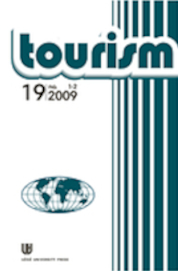„Czas” w turystyce: „czas indywidualny” i „czas społeczny”
DOI:
https://doi.org/10.18778/0867-5856.19.1-2.03Keywords:
czas indywidualny, czas zbiorowy, czas rodzinnyAbstract
Autor dokonuje przeglądu badań nad aktywnością turystyczną dochodząc do wniosku, że najlepiej specyfikę zachowań turystycznych oddają badania budżetowe czasu. Proponuje do tych analiz wykorzystać metodę Maxa Webera tzw. typu idealnego. W zakończeniu artykułu przedstawiono charakterystyczne przykłady czasu jakościowego (wypoczynku, wakacji, szeroko pojętej turystyki).
Downloads
References
Boulin J.-Y., 2008, Villes et politiques temporelles, La Documentation Française, Paris.
Google Scholar
Farrugia F., 1999, Une brève histoire des temps sociaux: Durkheim, Halbwachs, Gurvitch, Cahiers internationaux de sociologie, s. 95–117.
Google Scholar
Gurvitch G., 2007, Traité de sociologie, PUF, Paris.
Google Scholar
Herpin N., Verger D., 2008, Consommation et modes de vie en France, La Découverte, Paris.
Google Scholar
DOI: https://doi.org/10.3917/dec.herpi.2008.01
Maillard A., 2005, Les temps de l’historien et du sociologue – Retour sur la dispute Braudel – Gurvitch, Cahiers internationaux de sociologie, vol. 2, nr 119, s. 197–222.
Google Scholar
DOI: https://doi.org/10.3917/cis.119.0197
Pomian K., 1984, L'ordre du temps, Gallimard, Paris.
Google Scholar
DOI: https://doi.org/10.14375/NP.9782070701438
Revue française de sociologie, nr VIII, 1967.
Google Scholar
Thénoz M., 1981, La pratique touristique estivale et son impact dans un espace protégé: le cas de la Vallouise dans le parc national des écrins, R.G.L 3.
Google Scholar
DOI: https://doi.org/10.3406/geoca.1981.3952
Weber M., 1904, L'Ethique protestante et l'esprit du capitalisme.
Google Scholar
Downloads
Published
How to Cite
Issue
Section
License

This work is licensed under a Creative Commons Attribution-NonCommercial-NoDerivatives 4.0 International License.










